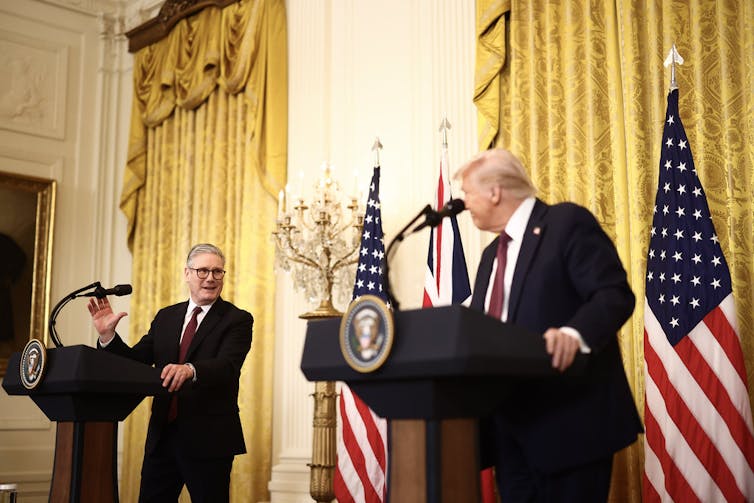Since the end of the cold war, the relevance of the North Atlantic Treaty Organisation (Nato) has regularly been questioned, even by its most prominent leaders. Its members, therefore, find it necessary to remind each other and the world of its value from time to time.
The latest example of this is the UK government’s new strategic defence review, which announces a “Nato-first” posture.
Nato has long been a cornerstone of UK foreign, defence and security policies. But this marks a particularly strident prioritisation of the organisation. It comes just a few years after Boris Johnson’s government began moving the country’s foreign and defence policy priorities towards the Indo-Pacific.
It tells us much about how Keir Starmer’s administration sees the UK’s place in the world in an unsettled era: as both an influential ally of the US and a reliable partner to European powers, eager to maintain regional and global influence.
Signed in 1949, the North Atlantic treaty committed its original 12 members to collective security: an attack on one would be an attack on all. In the shadow of the second world war, Nato went further than the nascent United Nations in its defence and security commitments. It brought together a somewhat eclectic mix of states straddling the Atlantic, from the North American behemoths of the US and Canada to tiny Iceland and Luxembourg, the dictatorship of Salazar’s Portugal and the democracies of Norway and Belgium.
The UK’s participation was largely heralded across an enthusiastic parliament. Winston Churchill, then leader of the opposition, praised this new “fraternal association”. The foreign secretary, Ernest Bevin, celebrated the community of interest [and] cooperation with like-minded people". UK politicians saw Nato as a means to connect with the US and Canada in particular.
Want more politics coverage from academic experts? Every week, we bring you informed analysis of developments in government and fact check the claims being made.
Sign up for our weekly politics newsletter, delivered every Friday.
The language at the time also reflected the casting of the Soviet Union as a threat to European security. Although the UK welcomed Nato as a liberal democratic organisation dominated by English-speaking peoples, its primary purpose was always to act as a strategic counterweight to the influence and encroachment of the Soviet Union in Europe. Hence the claimed irrelevance of Nato in the 1990s after the cold war, and its renewed importance today in the face of Russian aggression.
As always with UK foreign and defence policies, the relationship with the US is paramount. The UK’s Nato-first position is no exception. Starmer clearly believes he can forge a working relationship with the US president. Although seemingly far from natural bedfellows (although neither were John F. Kennedy and Harold Macmillan or even, politics aside, Ronald Reagan and Margaret Thatcher), Donald Trump appears unthreatened by the sober, understated Starmer.
The thought within Starmer’s foreign policy circle may well be that a loud and unequivocal statement of the UK’s commitment to Nato could help persuade Trump to stay the course with an organisation that he has often threatened to pull the US out of.
If, on the other hand, Starmer et al are more pessimistic and fear Trump making good on his threats, Nato clearly remains an attractive proposition in terms of the UK’s defence policy. While it does commit the UK to the defence of, say, the Baltic States and Finland, by the same token, Nato puts the UK in lockstep with fellow nuclear power, France, as well as the growing military power of Germany and significant others such as Turkey. In uncertain times, such allies are to be valued.
Global influence
Even before Brexit, a fear of losing global and regional influence has stalked every British government since 1945.
Questioning the wisdom of the departure from the EU remains a Westminster taboo. Yet one might forgive the incoming Labour government for feeling the chill of isolation while Trump occupies the White House and Russia threatens the continent. Nato thus also represents a valuable opportunity to retain regional and global influence. Note the language in Starmer’s introduction to the report when he refers to a desire to “lead in Nato”.

While the other defenestrated European colonial powers found post-1945 influence through the Francophonie or becoming leading civilian forces in what became the EU, the UK had the Commonwealth and Nato. These were the prime proxies for the lost colonial influence, even during the long EU interregnum.
Without the EU and with a more restive Commonwealth, Nato is of even greater importance. Although France’s president Emmanuel Macron is generally enthusiastic about Nato, there is a history of French ambivalence. The UK could well make the claim to be the most steadfastly committed of all the larger European members.
This renewed commitment to Nato from the UK government is consistent with the historic prioritisation of the organisation by successive administrations. The difference here is the urgency of the context: Europe faces an unprecedented military threat, while the US president is unpredictable and dubious in his attitude towards continental defence.
The Nato-first stance is a recognition of grim, strategic realities and also a “Hail Mary”, both pragmatic and hopeful. The UK is not alone in desperately hoping to keep the US commitment to European security alive. The strategic review’s commitment to a Nato-first policy may help – at the very least, it signals a UK administration keen to maximise its influence and retain robust ties with European allies.
Nick Whittaker does not work for, consult, own shares in or receive funding from any company or organisation that would benefit from this article, and has disclosed no relevant affiliations beyond their academic appointment.
This article was originally published on The Conversation. Read the original article.







